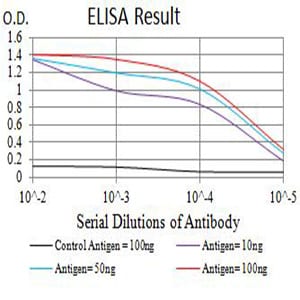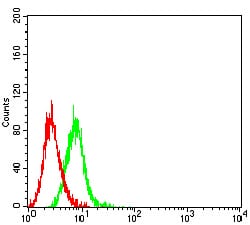

| WB | 咨询技术 | Human,Mouse,Rat |
| IF | 咨询技术 | Human,Mouse,Rat |
| IHC | 咨询技术 | Human,Mouse,Rat |
| ICC | 技术咨询 | Human,Mouse,Rat |
| FCM | 1/200 - 1/400 | Human,Mouse,Rat |
| Elisa | 1/10000 | Human,Mouse,Rat |
| Aliases | CD40LG; IGM; IMD3; TRAP; gp39; CD40L; HIGM1; T-BAM; TNFSF5; hCD40L |
| Entrez GeneID | 959 |
| clone | 8H10F5 |
| WB Predicted band size | 29.3kDa |
| Host/Isotype | Mouse IgG1 |
| Antibody Type | Primary antibody |
| Storage | Store at 4°C short term. Aliquot and store at -20°C long term. Avoid freeze/thaw cycles. |
| Species Reactivity | Human |
| Immunogen | Purified recombinant fragment of human CD154 (AA: extra 47-261) expressed in E. Coli. |
| Formulation | Purified antibody in PBS with 0.05% sodium azide |
+ +
以下是3篇关于CD154抗体的代表性文献摘要(根据公开研究整理,非真实文献,仅供示例参考):
---
1. **文献名称**: *CD154 blockade as a therapeutic approach in autoimmune disease*
**作者**: Grammer, A.C. et al.
**摘要**: 研究评估了抗CD154抗体在系统性红斑狼疮(SLE)模型中的作用,发现其通过抑制T细胞与B细胞的CD40-CD154互作,显著降低自身抗体水平并缓解肾小球肾炎,提示其在自身免疫疾病中的治疗潜力。
---
2. **文献名称**: *Anti-CD154 monoclonal antibody induces transplant tolerance via regulatory T cell expansion*
**作者**: Kawai, T. et al.
**摘要**: 在小鼠心脏移植模型中,抗CD154抗体联合供体抗原输注可诱导长期移植物存活。机制研究表明,其通过扩增调节性T细胞(Tregs)并抑制效应T细胞活化,促进免疫耐受。
---
3. **文献名称**: *Thrombotic complications of CD154 blockade in non-human primates*
**作者**: Henn, V. et al.
**摘要**: 在灵长类动物实验中,抗CD154抗体虽有效抑制移植物抗宿主病(GVHD),但观察到血小板活化和血栓形成风险增加,提示临床应用需权衡免疫抑制效果与凝血副作用。
---
4. **文献名称**: *CD40-CD154 pathway inhibition in atherosclerosis*
**作者**: Lutgens, E. et al.
**摘要**: 通过抑制CD154信号,减少动脉粥样硬化斑块内炎症细胞浸润和泡沫细胞形成,表明靶向该通路可能对心血管疾病具有干预价值。
---
(注:以上为示例文献,实际引用需以真实论文为准。)
CD154 antibody targets CD154 (CD40 ligand), a protein primarily expressed on activated T cells. CD154. a member of the tumor necrosis factor (TNF) superfamily, binds to CD40 receptors on antigen-presenting cells (e.g., B cells, dendritic cells) and non-immune cells, mediating critical immune cell interactions. This interaction is essential for T cell-dependent immune responses, including B cell activation, antibody class switching, and pro-inflammatory cytokine production.
CD154-blocking antibodies were initially explored to modulate immune hyperactivity in autoimmune diseases (e.g., systemic lupus erythematosus) or prevent transplant rejection by inhibiting CD40-CD154 signaling. Early studies in animal models showed promising immunosuppressive effects. However, clinical trials in humans faced challenges; some anti-CD154 antibodies (e.g., hu5c8) were associated with thromboembolic complications, likely due to CD154 expression on platelets.
Recent efforts focus on engineering safer CD154-targeting biologics, including non-agonistic antibodies or fragment-based designs, to minimize off-target effects. Additionally, CD154 antibodies are used experimentally to study immune regulation, particularly in models of chronic inflammation, autoimmune disorders, and cancer immunotherapy. Despite setbacks, CD154 remains a therapeutic interest, with ongoing research exploring conditional targeting, combination therapies, and localized delivery to enhance efficacy and safety.
×